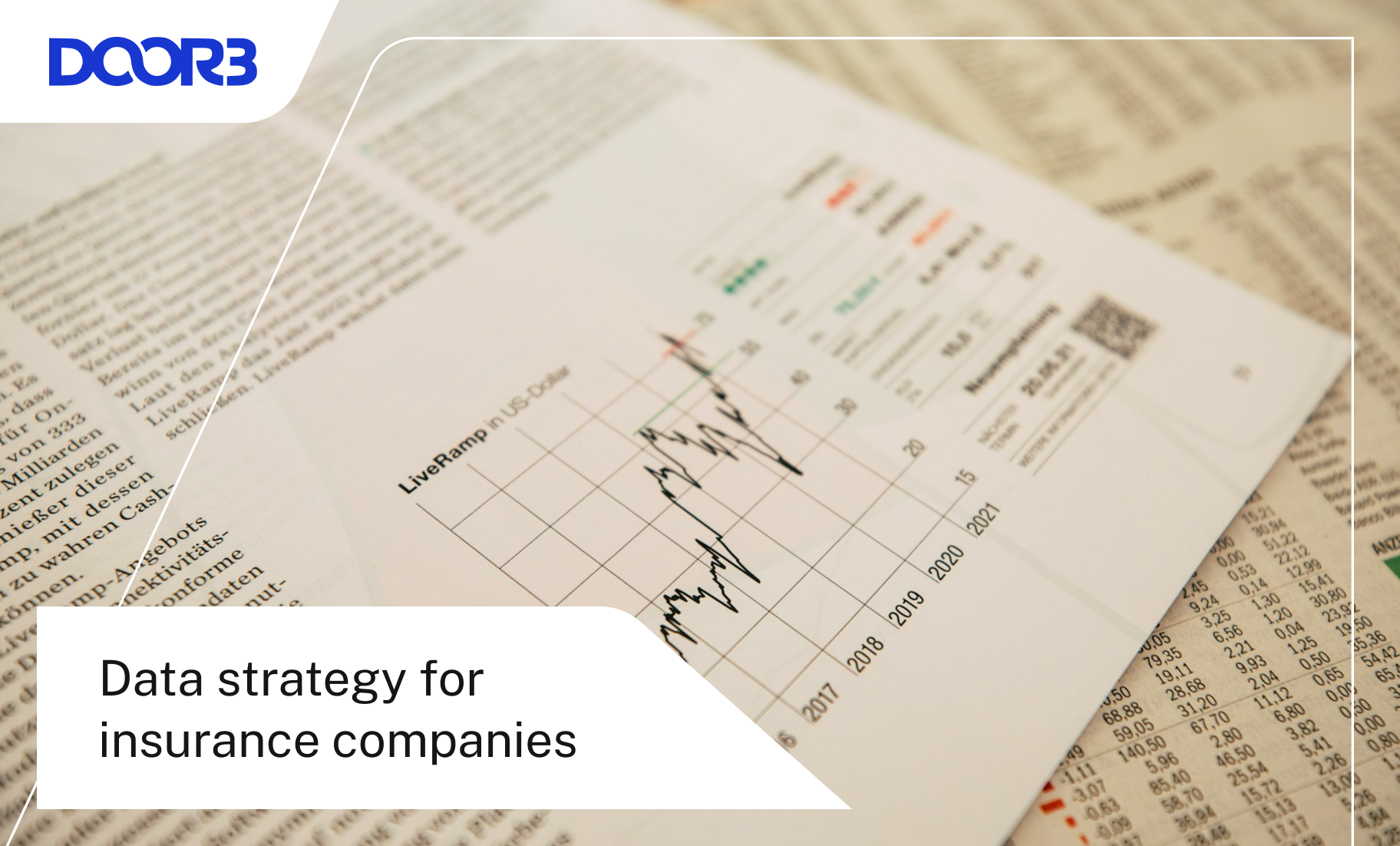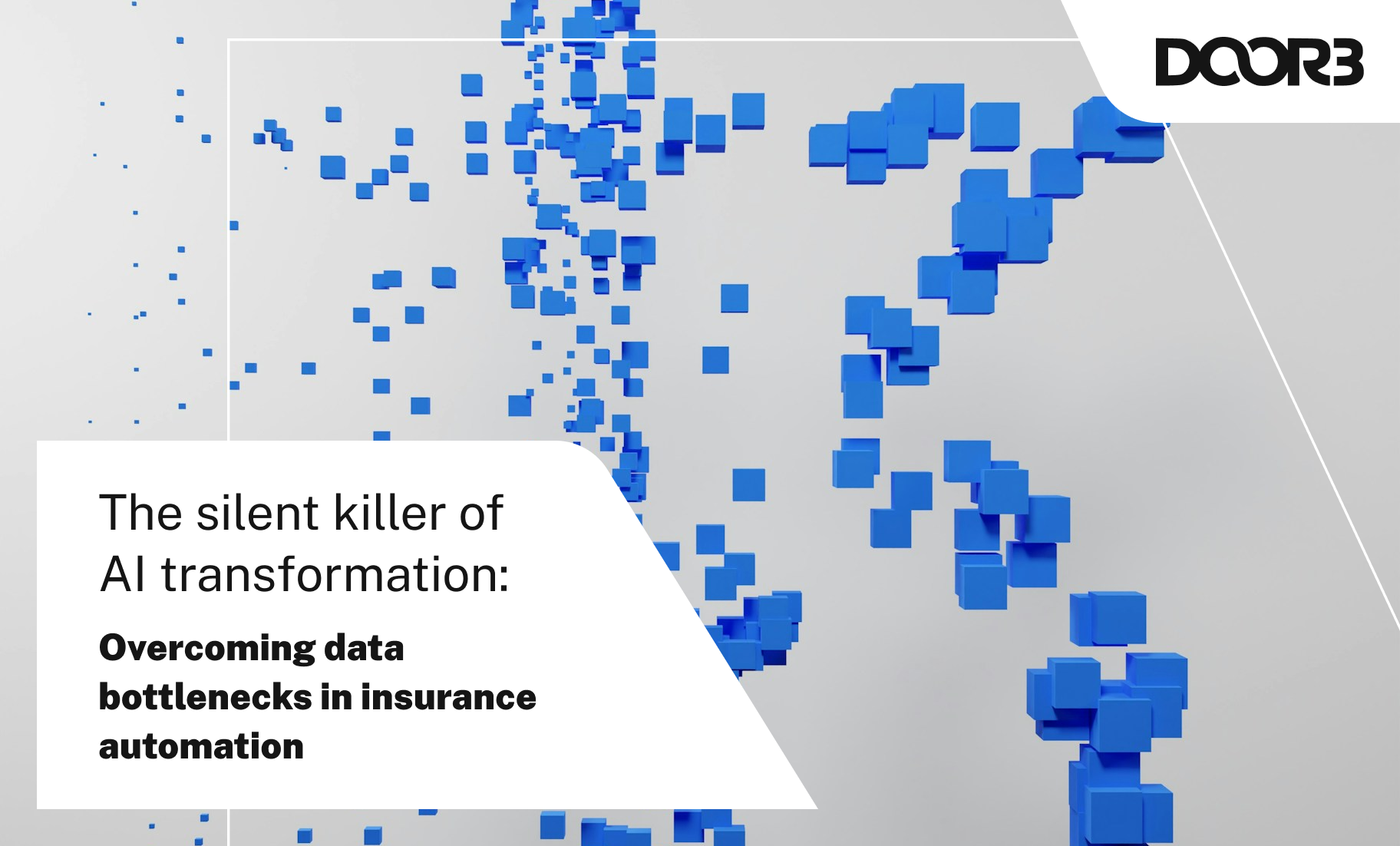Tips for Choosing the Right MVP Development Services Partner
02.19.2024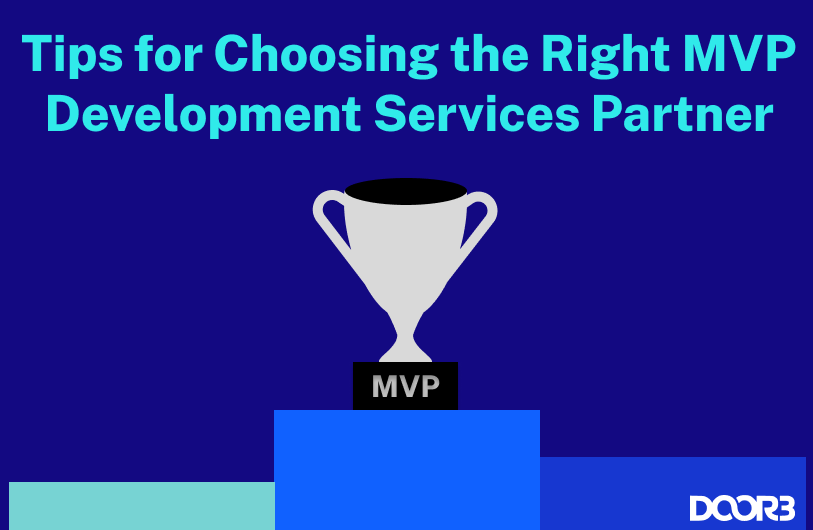
In the contemporary business landscape, speed and efficiency in product launch are key differentiators for companies vying for a competitive advantage. The concept of a Minimum Viable Product (MVP) has risen to prominence as a vital strategy for swiftly validating business ideas, garnering user feedback, and iteratively refining products grounded in real-world insights.
Selecting an apt MVP software development services partner is a pivotal step for businesses on the path to product innovation. A partner like DOOR3 not only brings the requisite expertise and experience but also instills confidence in navigating the intricacies of MVP software development, ensuring the successful delivery of solutions that resonate with market demands and propel business growth.
This guide aims to demystify the process of choosing the right MVP software development services partner, underscored by insights on the benefits of collaborating with DOOR3 for your MVP software development endeavors, whether you’re a nascent startup or an established corporation seeking innovation.
What is MVP in Software Development?
MVP in software development embodies a strategy focused on launching a product with enough features to attract early adopters and validate business hypotheses with minimal effort. The essence of MVP lies in its emphasis on speed to market and cost-efficiency, allowing businesses to gather critical feedback for future iterations.
“MVP software development is about striking the right balance between what’s essential for the market and what can be developed swiftly to meet those needs,” said Dima Kushch, Engineering Practice Lead for DOOR3. “This approach accelerates time-to-market and reduces development costs while ensuring the product aligns closely with user expectations.”
Why Consider MVP Software Development Services?

Embracing MVP software development services offers a strategic advantage, empowering businesses to navigate their product innovation journey with precision and efficiency. The essence of MVP software development lies in its focus on the fundamentals—building a product with just enough features to engage early adopters and validate a market fit quickly. This approach is key to entering the market effectively and ensuring your product is poised for success.
A critical aspect of MVP software development is the ability to identify and prioritize core features that meet user needs, ensuring the creation of a validated product ready for the competitive landscape. This strategy accelerates time-to-market, significantly reduces development costs, and enhances product-market fit, benefiting businesses by allowing them to adapt swiftly to user feedback and evolving market demands.
Partnering with a knowledgeable and experienced company in MVP software development can further amplify these benefits. For instance, DOOR3 brings a comprehensive understanding of MVP in software development principles and a commitment to delivering tailored, value-driven solutions. Our expertise ensures that businesses not only launch their products efficiently but also secure a strong position for growth and success in their markets. Engaging with DOOR3 for MVP software development services signifies a step towards innovation, led by a team dedicated to crafting solutions that truly resonate with target audiences and meet market needs.
Key Benefits:
1. Faster Time-to-Market
MVP software development strategies are designed to expedite product delivery, significantly reducing the time it takes for a product to go from an idea to being available to users. This rapid deployment allows businesses to seize market opportunities and gain a competitive edge by being first or early to market.
This was a huge gain when we worked with DOOR3 client, Retrievr. Being a novel service, hitting the market quickly and early provided a competitive advantage, as the team was able to begin iterating and innovating while building consumer momentum.
2. Cost Efficiency
By concentrating on creating a product with just the essential features necessary to satisfy early adopters and validate the product concept, companies can significantly reduce development costs. This focus helps in avoiding the expenditure on features that do not contribute to the product’s initial success, ensuring resources are used efficiently.
3. Iterative Feedback Loop
The process of MVP software development emphasizes an iterative feedback loop, where the product is continuously refined based on user feedback. This approach not only improves the product with each iteration but also aligns it more closely with user expectations and market needs, enhancing overall product quality.
DOOR3 takes an Agile approach to software development, meaning that iterative development is one of the most important aspects of our process. MVP software development helps us capitalize on this approach, churning out software solutions that evolve faster than teams that take a more traditional approach.
4. Risk Mitigation
Developing an MVP in software development allows businesses to test the market demand and validate product assumptions with minimal resources before fully committing to a comprehensive product build-out. This early validation helps in minimizing the likelihood of project failure, as decisions are informed by real-world data and user feedback.
5. Market Validation
MVP software development is instrumental in achieving market validation early in the product life cycle. It enables businesses to quickly adapt based on user feedback and changing market conditions, ensuring that the product evolves in a direction that is more likely to succeed in the marketplace.
6. User-Centric Approach
Adopting an MVP software development strategy ensures a focus on customer needs from the outset. By prioritizing features and updates that directly address user pain points and requirements, businesses can ensure their product is genuinely value-adding for its intended audience.
At DOOR3, our user-centric approach goes beyond merely identifying user needs; it involves engaging with the end-users throughout the MVP software development process to ensure their voices are heard and their feedback is integral to the product evolution. By employing a mix of qualitative and quantitative research methods, including user interviews, surveys, and usability testing, we gain deep insights into user behaviors, preferences, and pain points. This supports the iterative feedback loops, and allows us to refine and adjust the MVP. Our user-centric approach ensures that each feature we introduce not only solves a real problem but also enhances the overall user experience.
7. Flexibility and Adaptability
The nature of MVP software development offers businesses the flexibility to adapt to changing market conditions and customer preferences. This agility ensures that the product remains relevant and poised for growth, even as external factors evolve. Paired with an Agile methodology, DOOR3 MVPs have the capable of adapting at impressive speeds.
Key Sourcing Models for MVP Development Services
Selecting the right sourcing model for your Minimum Viable Product (MVP) is a critical decision that can significantly impact the success of your project. Understanding the various sourcing models available for MVP software development is essential for aligning your project with the best resources, expertise, and cost structure. Let’s explore the key sourcing models in the software development industry, highlighting the advantages and disadvantages of each.
1. In-house Development
In-house development involves utilizing your company’s internal resources and team for the development of the MVP. We do in-house development for our internal projects at DOOR3, and it’s a highly effective model for fast and reliable development.
Take our website for example. Developed in-house, we retain full autonomy over the project and are capable of revising or iterating elements at any point in time. With the accelerated speed of digital evolution, this capability gives us a competitive edge to showcase our talents and modern sensibilities through website iteration. This model of development is truly one of the most effective, but is unlikely to be feasible for businesses not working in the development space, as there is a high level of prerequisite knowledge required for software development.
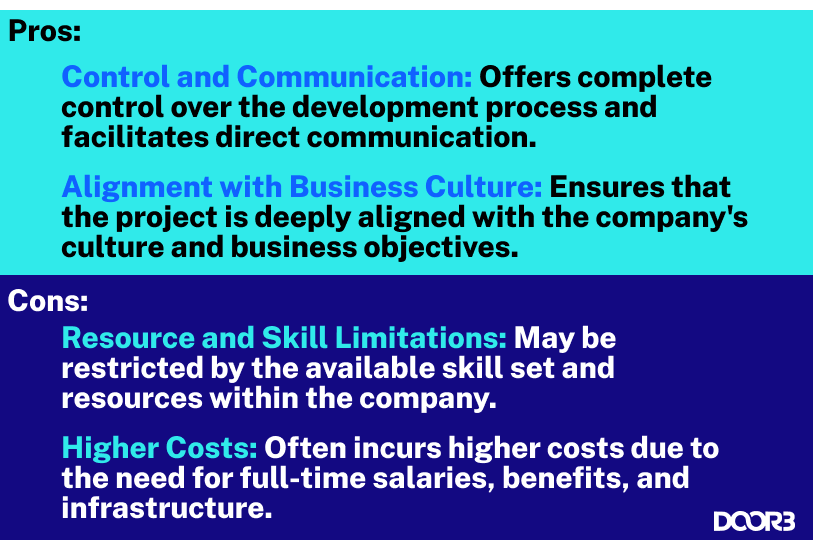
2. Outsourcing
Outsourcing MVP software development means entrusting the project to an external company specializing in software development. A majority of our clients at DOOR3 are outsourcing their project to us. In fact, every instance of a case study on our website is an example of our clients outsourcing work to us.
Outsourcing can be extremely effective with the right team, giving you access to the best MVP software development services in the US. You can see our client feedback to determine how DOOR3 might be the right team for you. However, teams with less transparency and communication skills may create roadblocks on you development path. It’s important to seriously vet potential development partners, as the risk of a project handover increases with a lack of proper vetting ( more on that later).
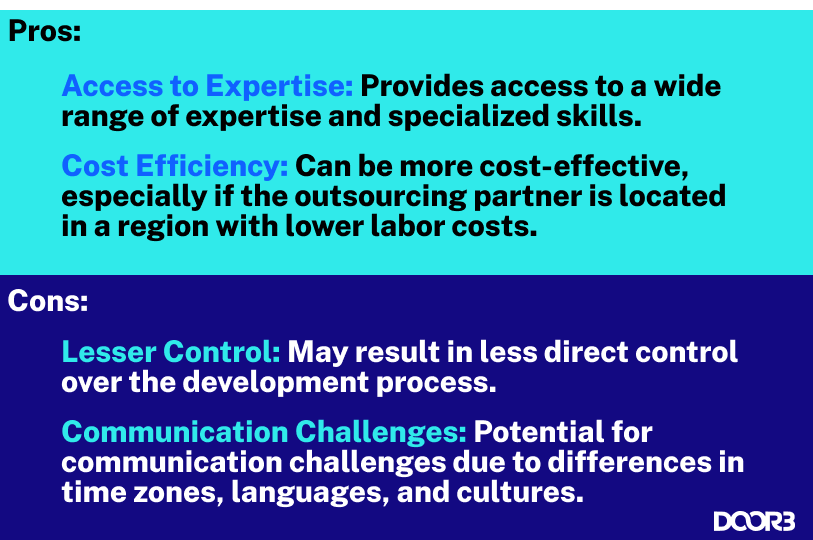
3. Offshoring
Offshoring is a type of outsourcing where the development work is delegated to a company or team located in a different country, often with a significant time zone difference. Offshoring can be significantly more risky, and is usually considered when costs present a barrier to in-house or locally outsourced development. Countries like India, the Philippines, Estonia, and Poland lead the globe in offshore software development.
This isn’t to say that offshored development can’t be successful, it just presents higher risks. Cultural, time, and language differences might create barriers from creating the best possible MVP in software development, and if a offshore developer commits shady business practices against you, it might be more difficult to prosecute that team. We find that most project handovers given to DOOR3 come from offshore developers, who ran over time/budget, or were not able to execute the project as intended.
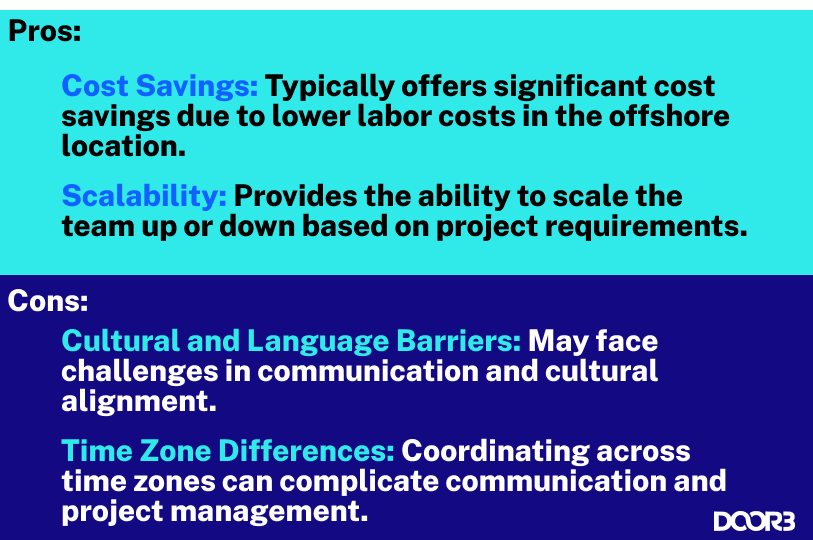
4. Nearshoring
Nearshoring refers to outsourcing MVP software development to a company or team located in a nearby country, usually within the same time zone or a closely related one. Many of the same pros and cons of offshoring apply to nearshoring but on a less extreme scale, as usually with nearshoring, cultural, time, and language differences are reduced.
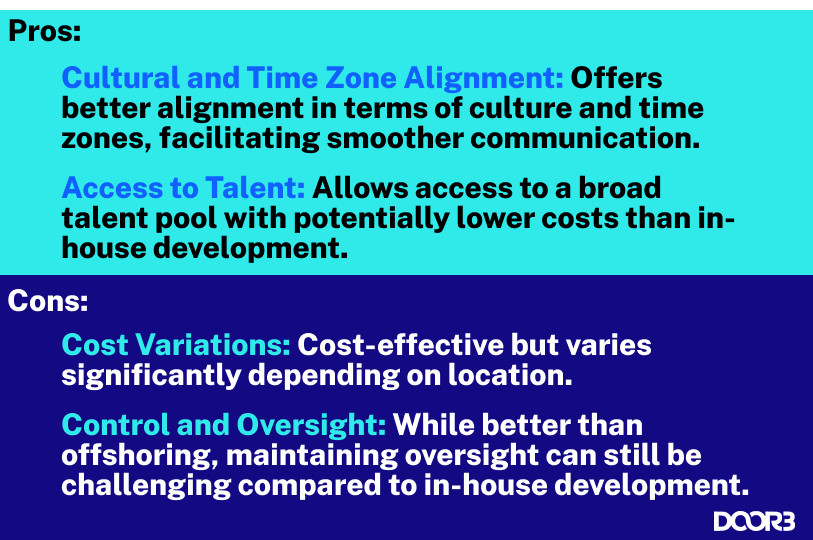
When navigating the complexities of choosing the most suitable sourcing model for MVP software development, it’s crucial to consider your project’s unique requirements, budget constraints, and strategic goals. Consulting with experts like DOOR3 who have a deep understanding of these models and their implications can provide invaluable insights, ensuring that your MVP development process is not only efficient and cost-effective but also aligned with your long-term business objectives.
Tips for Choosing the Right MVP software Development Services Partner
1. Evaluate Technical Proficiency
Look for a partner with a proven track record of technical excellence in developing MVPs. Assess their expertise in the latest technologies and development methodologies that are critical for building a scalable and robust MVP in software development. Their ability to leverage cutting-edge tools and frameworks will be crucial in the efficient execution of your project. If a potential partner doesn’t have an asset like DOOR3’s custom software development page or a list of development technical proficiencies, you might have to be fairly deliberate and diligent in receiving information around process and capability.
2. Assess Industry Experience
A partner with experience in your specific industry can bring invaluable insights and a deeper understanding of your target market’s challenges and opportunities. They are more likely to anticipate potential pitfalls and provide solutions that are tailored to your industry’s unique needs.
While there are a few industries that stand out to us as strong fits for our work, we consider ourselves business agnostic when it comes software developement. Clients like Stillwell-Hansen show off our experience in manufacturing, while our work with entertainment giant WWE proves just how versatile a company like us can be when applying the DOOR3 way.
3. Review Client Testimonials
Client testimonials like the ones on DOOR3’s Clutch page and case studies like the materials on our site can provide a glimpse into the partner’s ability to deliver successful projects. Look for feedback that highlights their approach to problem-solving, ability to meet deadlines, and the quality of the final product. Positive testimonials from past clients are a strong indicator of a reliable and competent partner.
4. Evaluate Innovation Culture
An MVP software development partner with a culture of innovation will be better equipped to think creatively and offer unique solutions to complex problems. Explore how they foster innovation within their team and their approach to overcoming technical challenges. A partner who values and encourages innovation can be a significant asset in developing a groundbreaking MVP.
Teams that confidently built bespoke solutions are likely be better innovators than those who follow pre-existing solution structures. DOOR3 has a wealth of custom software development projects available to review, all of which required constant iteration and innovation to turn into the integral solutions many are today.
5. Consider Thought Leadership
Thought leadership in MVP software development is a testament to a partner’s expertise and commitment to staying ahead of industry trends. Businesses with leadership teams that focus on continued education and deep pockets of experience tend to be more dedicated to contributing to the advancement of technology and development practices. Check out the leadership at DOOR3 to see how our thought leadership set an excellent example when considering an MVP software development services partner.
6. Assess Project Scale
Understanding a partner’s experience with projects of similar scale to yours is crucial. A partner who has successfully managed projects of a similar or larger scale will have the necessary processes and infrastructure in place to handle your MVP software development effectively.
At DOOR3, we’ve built solutions for startups all the way to one of the largest multinational food, snack, and beverage corporations in the world. So while working with a partner that has worked at a relevant scale is important, working with a partner with experienc on either end of the spectrum is even better.
7. Evaluate Client Relationships
A partner’s ability to build and maintain strong client relationships is indicative of their reliability and professionalism. Consider how DOOR3 emphasizes communication and collaboration with our clients throughout the development process. A partner who views their clients as collaborators rather than just customers is more likely to be committed to your project’s success.
Our clients speak for themselves.
“We were highly impressed with their communication and willingness to collaborate. When we had questions, their answers were always well-researched. The process was fun, and it was energizing to work with DOOR3.” -UX Manager, SaaS Company, Alexis Lellios Assess Project Management Practices Effective project management is critical to the timely and successful delivery of an MVP. Evaluate the partner’s project management methodologies, tools, and their approach to handling project timelines, budget, and scope changes. Good project management practices are essential for ensuring that your project stays on track and meets your expectations.
Take a look at what some of our clients have said about DOOR3 project management
“They had a great Project Leader who served as a Scrum Master and their BA analysts really know how to break down the stories, and everyone in their team understands Agile.” Sr Product Mgr, Personal Protection Equipment Manufacturer
“Their product management was amazing, and they let us know what we needed to provide to them.” Chief Product Officer, RISA Tech, Debbie Penko
Case Study: MVP Software Development by DOOR3
Stillwell-Hansen had approached us with the goal of using our MVP software development services to leverage digital tools to significantly enhance their operational efficiency and customer service. The challenge was to create a streamlined and intuitive platform capable of supporting their complex business operations while also providing a scalable framework for future growth.
Facing the intricate task of integrating complex business logic into an accessible user interface, alongside ensuring high data reliability and system scalability, we recognized the need for a tailored approach. These challenges necessitated a deep dive into Stillwell-Hansen’s operational processes, allowing us to identify and prioritize core features that would not only address immediate needs but also pave the way for ongoing enhancements.
Our strategy involved an iterative development process, focused on creating a robust MVP that could evolve in line with Stillwell-Hansen’s expanding requirements. By closely collaborating with Stillwell-Hansen, we were able to navigate the project’s complexities successfully, delivering a solution that not only met but exceeded their expectations in terms of scalability, efficiency, and user experience.
The testimonial from Stillwell-Hansen’s Senior Product Manager, “DOOR3 does everything over and beyond to ensure the success of your project,” truly encapsulates our dedication to our clients. It reflects our ethos of going above and beyond in every project we undertake, ensuring that we deliver solutions that empower our clients to achieve their business objectives and gain a competitive edge in their market. Our expertise in MVP software development, combined with a deep understanding of our clients’ industries, positions us as a pivotal partner in their journey towards digital innovation and market leadership.
Skills Required For MVP Software Development

Developing a Minimum Viable Product (MVP) is not about cutting corners to release a product quickly; it’s about smart prioritization, understanding market needs, and executing with precision. Let’s look at some insights directly from our experienced team at DOOR3 on the essential skills required for MVP software development.
1. Agile Project Management
“Agile project management is at the core of effective MVP software development. It allows us to be adaptive, responsive to feedback, and iterative in our approach. This skill is crucial for navigating the fast-paced environment of MVP projects, where priorities can shift rapidly based on user feedback or market demands.” -Michael Montecuollo, Director of Principle Consulting
2. Technical Proficiency in Modern Development Tools and Languages
“A strong foundation in modern development tools and languages is essential. For MVP software development, we often lean on frameworks and languages that allow for rapid prototyping and easy iteration, such as React for front-end development or Node.js for the backend. Understanding these technologies enables us to build quickly and efficiently.” -Laena Ilk, Director of Solutions Architecture
3. User Experience (UX) and User Interface (UI) Design
“UX/UI design skills are vital in MVP software development. The MVP must not only function well but also offer a compelling user experience right from the start. This involves a deep understanding of user needs and behaviors, as well as the ability to design intuitive interfaces that engage and retain early adopters.” -Tom McClean, UX & Design Practice Lead
4. Business Analysis and Market Understanding
“Developing an MVP isn’t just a technical endeavor; it requires a keen understanding of the business landscape and market needs. Our developers work closely with business analysts to ensure the MVP addresses a genuine market gap or user pain point. This alignment is critical for the MVP’s success.” -Bart Michalak, Business Analysis Practice Lead
5. Rapid Prototyping and Testing
“The ability to prototype rapidly and test iteratively is key. This skill enables us to quickly turn concepts into testable products and refine them based on real user feedback. It’s about learning fast, failing fast (if necessary), and moving forward with enhanced insights.” -Laena Ilk, Director of Solutions Architecture
6. Data Analysis and Feedback Integration
“Once an MVP is launched, the ability to analyze user data and integrate feedback into subsequent iterations is crucial. Skills in data analysis help us understand how users interact with the MVP, identify trends, and make informed decisions on what features to prioritize, adjust, or remove in the next iteration.” -Bart Michalak, Business Analysis Practice Lead
7. Effective Communication and Team Collaboration
“Strong communication and collaboration among team members are essential for the success of an MVP in software development. It ensures that everyone is aligned on the project goals, understands the user feedback, and works together seamlessly to iterate on the product.” -Val Kerzhentseva, Project Management Practice Lead
8. Adaptability and Problem-Solving
“Adaptability and problem-solving are skills that every MVP software developer needs. The path from concept to MVP is rarely straightforward. Being able to adapt to challenges, pivot when necessary, and find creative solutions to obstacles is what enables us to deliver successful MVPs to our clients.” -Dmytro Onypko, DevOps Practice Lead
These insights from DOOR3 developers highlight the multifaceted skill set required for successful MVP software development. It’s a blend of technical prowess, design sensibility, business acumen, and soft skills like communication and adaptability. At DOOR3, we bring these skills to every MVP project, ensuring our clients’ products are not just viable but poised for growth and success in the competitive market landscape.
Roles of Our MVP Software Development Team

At DOOR3, one of the best MVP software development services in the US, our MVP software development team comprises various roles, each contributing unique skills and expertise to the project. Here’s a closer look at the pivotal roles within our team and how they collaborate to bring an MVP from concept to reality.
1. Project Manager
The project manager is the linchpin of the MVP software development process, ensuring that everything runs smoothly, on time, and within budget. They are responsible for planning, executing, and closing projects, facilitating communication between stakeholders, and solving problems that arise during development. Their role is critical in maintaining a clear vision and direction for the project, ensuring efficient development, and fostering effective communication among team members and with clients.
2. Business Analyst
Our business analysts play a crucial role in shaping the MVP based on thorough market analysis and a deep understanding of user needs. They bridge the gap between business objectives and technical solutions, identifying key features that align with market demands and user expectations. Their insights inform the development strategy, ensuring the MVP addresses a real need in the market and has a solid value proposition.
3. UX Designer
The UX designer is responsible for designing a user-centric experience for an MVP in software development. They focus on understanding how users will interact with the product and strive to create a seamless, intuitive user journey. By employing user research, wireframing, and prototyping, UX designers ensure the MVP is not only functional but also enjoyable to use, thereby enhancing user engagement and satisfaction.
4. UI Designer
UI designers transform the UX design into visually appealing and interactive MVP interfaces. Their work is crucial in making the first impression on users and plays a significant role in the product’s adoption. Through the use of color, typography, and layout, UI designers create an aesthetically pleasing interface that complements the UX design and encourages user interaction.
5. Back-end Developers
The back-end developers are the architects of the server side of the MVP, working on database management, server logic, and API integration. They ensure that the MVP’s infrastructure is robust, scalable, and secure, enabling smooth operations and data management. Their expertise is crucial in creating the technical backbone of the product, allowing for the efficient handling of user data and integration with other services.
6. Front-end Developer
Front-end developers bring the MVP’s UI/UX design to life, implementing it for user interaction. They use a variety of programming languages and frameworks to create responsive, interactive elements that users interact with directly. Their work is critical in ensuring the MVP is accessible, user-friendly, and functional across different devices and platforms.
7. Quality Assurance Engineer
Quality assurance engineers are vital in ensuring the MVP is of the highest quality through rigorous testing. They identify bugs, inconsistencies, and any deviations from the specified requirements. Their meticulous testing processes cover various aspects, including functionality, usability, performance, and security. This role is essential in guaranteeing that the MVP is reliable, performs well under different conditions, and delivers a seamless user experience.
Each member of our MVP software development team plays a vital role in turning innovative ideas into viable products that are ready for market introduction. Through their collective expertise and dedication, we ensure that our clients’ MVPs are not only technically sound but also strategically positioned to meet user needs and achieve business objectives.
Key Components of DOOR3’s MVP Software Development Process
The development of a Minimum Viable Product (MVP) at DOOR3 is a structured yet flexible process, designed to bring innovative ideas to market swiftly and efficiently. Our approach is what makes us one of the best MVP software development services in the US, and is rooted in a deep understanding of the digital landscape, leveraging both our extensive expertise and our rich experience across industries. Here’s an insight into the key components of our MVP software development process:
1. Discovery and Ideation
At the outset, we leverage DOOR3’s profound industry knowledge and market research capabilities to unearth market gaps, pinpoint user needs, and identify potential opportunities for MVP software development. This stage is foundational, setting the direction for the entire project.
Drawing upon insights from past MVP projects and client engagements, we ensure the ideation phase is fully informed and aligned with both business goals and user expectations. This historical knowledge enriches the ideation process, ensuring the MVP concept is both innovative and grounded in reality.
2. Feature Prioritization and Definition
Utilizing our deep expertise in product strategy and feature prioritization, we define the core functionalities that are essential for the MVP’s success. This involves a meticulous analysis to distinguish ‘must-have’ features from ‘ nice-to-have’ elements, ensuring the MVP focuses on delivering real value to users from day one.
Our experience in MVP development enables us to prioritize features based on their impact on user experience, market differentiation, and technical feasibility. This prioritization is critical for creating a product that not only meets user needs but also stands out in the market.
3. Prototyping and Iterative Development
DOOR3’s proficiency in rapid prototyping and iterative development methodologies allows us to quickly build and test MVP concepts. This agility is key to our process, enabling us to develop, test, and refine ideas without excessive time or resource expenditure.
We apply lessons learned from previous MVP iterations to continuously refine prototypes, iterate on features, and incorporate user feedback in real-time. This iterative process enhances product usability and ensures a strong market fit, adapting the product based on actual user interactions and feedback.
4. User Testing and Validation
Our user-centered design approach and usability testing capabilities are crucial for validating MVP assumptions and gathering actionable insights. By focusing on the user, we ensure the MVP not only functions as intended but also meets the users’ expectations and needs.
Drawing on extensive experience in conducting user tests, interviews, and surveys, we validate MVP hypotheses, identify pain points, and iterate on product features. This ensures optimal user satisfaction and lays a solid foundation for future enhancements.
5. Scaling and Growth Strategy
Leveraging our strategic consulting expertise, we develop a comprehensive roadmap for scaling the MVP into a fully-fledged product. This roadmap is designed to capture market opportunities and position the product for sustained growth.
Insights gained from scaling previous MVPs inform our strategies for future growth. We develop tailored growth strategies, refine product roadmaps, and optimize feature enhancements based on user feedback and market demand, ensuring the MVP can evolve and adapt over time.
At DOOR3, our MVP software development process is a testament to our commitment to delivering products that not only meet but exceed our clients’ expectations. Through a blend of expertise and experience, we guide our clients from concept to market with a strategy that ensures success, scalability, and sustainability.
Why Hire DOOR3 for MVP Software Development Services
When considering MVP software development services, choosing a partner with a comprehensive suite of capabilities is crucial. Here’s why DOOR3 stands out as the best MVP software development services in the US for businesses seeking to navigate the complexities of MVP software development:
1. Unmatched Expertise
At DOOR3, we pride ourselves on our deep-seated knowledge and practical mastery of MVP strategies. Our approach guarantees the efficient delivery of solutions that are not just viable but are meticulously crafted to add tangible value to your business.
2. Impressive Success Stories
Our rich history of success, underscored by a diverse portfolio of MVP projects across various sectors, speaks volumes. Trust in our proven ability to bring your vision to life, validated by our extensive track record of creating impactful MVPs that resonate with target markets.
3. Personalized Development Strategies
We understand that each business is unique. That’s why we offer customized MVP software development strategies that are perfectly aligned with your specific business objectives and the needs of your target audience. This tailored approach ensures that every aspect of your MVP is optimized for success.
4. Agility at Our Core
Adopting Agile methodologies, DOOR3 ensures that your MVP software development process is as dynamic and flexible as the market demands. Our expertise in Agile practices allows for rapid iteration and adaptability, ensuring that your project remains on the cutting edge and can pivot as needed in response to feedback and market shifts.
5. Commitment to Transparency
Clear and open communication is the cornerstone of our partnership approach. Throughout the MVP software development process, we maintain a high level of transparency, ensuring that you are always aligned with project progress, objectives, and any shifts in strategy. This commitment to clear communication fosters trust and ensures that we are always moving together towards your goals.
6. A Partnership That Delivers
When you choose DOOR3, you gain more than a service provider; you gain a partner deeply committed to your project’s success. Our team works collaboratively with yours, ensuring that every step taken is in pursuit of achieving measurable outcomes and delivering an MVP that stands out in the marketplace.
Partnering with DOOR3 for your MVP software development needs means placing your project in the hands of experts dedicated to excellence. Our blend of proven expertise, customized strategies, agility, transparency, and a collaborative spirit ensures that your MVP is not only launched successfully but is poised for growth and impact in your industry.
FAQs

1. What is an MVP in software development?
An MVP, or Minimum Viable Product, in software development is a strategy focused on creating a new product with the minimum necessary features to satisfy early adopters and validate a product concept in the market quickly. It aims to gather user feedback for future development while minimizing initial costs and time.
2. How long does it take to develop an MVP?
The development time for an MVP can vary depending on several factors, including the complexity of the product, the features to be included, and the team’s experience. Typically, an MVP can be developed within a few weeks to a few months, aiming to launch a functional product to the market as swiftly as possible.
3. How much will it cost to build an MVP?
The cost of building an MVP depends on various factors, such as the scope of the project, the technology stack used, the number of features included, and the team’s hourly rates. It’s designed to be a cost-effective way to test a product idea, with costs significantly lower than developing a full-featured product.
4. What are the benefits of MVP software development services?
MVP software development services offer numerous benefits, including faster time-to-market, reduced development costs, minimized risk, and the ability to gather valuable user feedback early in the development process. This approach allows businesses to validate their product ideas and make informed decisions about further development and investment.
5. How is the MVP development process organized at DOOR3?
At DOOR3, the MVP software development process is organized around Agile methodologies, emphasizing iterative development, continuous feedback, and rapid prototyping. Our approach focuses on delivering the core functionality essential for market validation while allowing for flexibility and scalability as the product evolves.
6. What tips can you provide for choosing the right MVP development partner?
When choosing an MVP software development partner, consider the following tips: Evaluate their technical proficiency and industry experience; review client testimonials to assess their track record; evaluate their innovation culture and thought leadership; assess the scale of projects they have handled; evaluate their client relationships and project management practices. Selecting a partner with a proven track record, aligned with your project’s needs and goals, is crucial for the success of your MVP.
